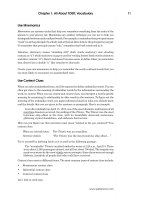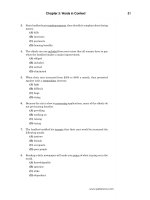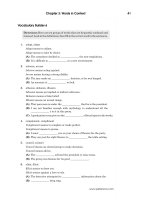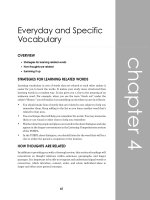Tài liệu Master toefl vocabulary part 11 ppt
Bạn đang xem bản rút gọn của tài liệu. Xem và tải ngay bản đầy đủ của tài liệu tại đây (100.41 KB, 10 trang )
○○○○○○○○○○○○○○○○○○○○○○○○○○○○○○○○○○○○○○○○○○○○○○○○○○○○○○○○○○○○○○○
○○○○○○○○○○○○○○○○○○○○○○○○○○○○○○○○○○○○○○○○○○○○○○○○○○○○○○○○○○○○○○○○○○○○○○○○○○○○○○○○○○○○○○○○○○○○○
Chapter 4: Everyday and Specific Vocabulary 91
www.petersons.com
SUMMING IT UP
•
Make a list of words that relate to each other.
•
Words that relate to people and places are usually tested in the short dialogues.
•
Words that relate to people and places appear in the longer conversations in the
Listening Comprehension section.
04_TOEFL Vocab,Ch4,60-92 8/4/06, 12:3891
04_TOEFL Vocab,Ch4,60-92 8/4/06, 12:3892
○○○○○○○○○○○○○○○○○○○○○○○○○○○○○○○○○○○○○○○○○○○○○○○○○○○○○○○○○○○○○○○○○○○○○○○
chapter 5
93
All About Roots
OVERVIEW
• Word roots
• Strategies for learning roots
• How roots work
• Learning words with Greek roots
• Learning words with Latin roots
• Summing it up
WORD ROOTS
The root of a word contains the basic meaning. Prefixes and suffixes can be
added to a root. For example, the root cred means “believe,” so the English word
“credible” means “believable.” Learning the roots of words will help you work out
the meaning of words you do not know and will consequenly help you with all
parts of the TOEFL test. Since there are a great number of roots from which
words stem in English, the most common ones are presented in this chapter.
STRATEGIES FOR LEARNING ROOTS
•
Most word roots are never used alone. They may have prefixes and suffixes
attached to them.
•
At first you may not see how a particular word grew from the word root. But
when you begin to analyze the word, you will see the connection.
•
Once you recognize word roots, you will see connections among many words.
This will make it easier for you to understand and remember their meanings.
•
Try to learn a number of word roots each day. Review the roots you have
learned before and try to use them in speech or writing.
•
Every time you look up a word in the dictionary, look at its word root (most
roots in English come from Latin or Greek).
05_TOEFL Vocab,Ch5,93-116 8/9/06, 11:5193
94 PART III: TOEFL Vocabulary Review
○○○○○○○○○○○○○○○○○○○○○○○○○○○○○○○○○○○○○○○○○○○○○○○○○○○○○○○○○○○○○○○
○○○○○○○○○○○○○○○○○○○○○○○○○○○○○○○○○○○○○○○○○○○○○○○○○○○○○○○○○○○○○○○○○○○○○○○○○○○○○○○○○○○○○○○○○○○○○
www.petersons.com
HOW ROOTS WORK
Prefixes and Suffixes Are Added to Roots to Create Many Words
For example, the root vor means “to eat.” If you are a voracious (voh-ray-shus) eater, you
eat a lot of food. In the following examples, the root “vor(e)” is combined with prefixes
and suffixes to describe types of eaters in the plant and animal kingdoms.
Cover the last column of the following chart and see how many of these words you can
figure out by just knowing the meaning of the root “vor.”
Word Prefix Meaning Root Meaning Word Definition
carnivore carni meat vor eat meat eater
insectivore insect bug vor eat bug eater
herbivore herb plants vor eat plant eater
granivore gran grain vor eat grain eater
frugivore frug fruit vor eat fruit eater
graminivore gram grass vor eat grass eater
nectarivore nectar juice vor eat nectar (juice) eater
omnivore omni everything vor eat eats everything
Knowing how the words were created can help you figure out many words you encounter
on standardized tests. In addition, you can use these decoding skills to figure out the
meaning of all the new words that are created every day.
Here’s the basic drill:
Adding a prefix to a root Adding a suffix to a root
de + hydrate = dehydrate zoo + ology = zoology
hydro + power = hydropower bronch + itis = bronchitis
The following chart shows additional examples of how words are put together. Knowing
this process can help you take them apart to define them. Remember: words are like
people: it’s easy to figure them out . . . once you know their parts.
Prefix + Root + Suffix = New Word Meaning
re + fer + al = referral connection
de + ter + ent = deterrent impediment
re + pul + sion = repulsion send back
dis + pel + ed = dispelled driven away
re + tract + able = retractable draw back
im + peril + ed = imperiled put in danger
dis + credit + ed = discredited to cause disbelief
ab + duct + ed = abducted kidnapped
05_TOEFL Vocab,Ch5,93-116 8/9/06, 11:5194
○○○○○○○○○○○○○○○○○○○○○○○○○○○○○○○○○○○○○○○○○○○○○○○○○○○○○○○○○○○○○○○
○○○○○○○○○○○○○○○○○○○○○○○○○○○○○○○○○○○○○○○○○○○○○○○○○○○○○○○○○○○○○○○○○○○○○○○○○○○○○○○○○○○○○○○○○○○○○
Chapter 5: All About Roots 95
www.petersons.com
Even if you can’t define a word exactly, recognizing the root will give you a general idea
of the word’s meaning. For example, if you read the word geocentric, knowing the root
geo would help you figure out that geocentric has to do with the center (“centric”) of the
Earth or Earth as the center.
A Word Can Contain More Than One Root
For example, the word matrilineal contains the roots matri (mother) and lineal (line).
Putting it together, you can deduce that matrilineal means “determining ancestry
through the female line.”
Some Roots Are Words Themselves
For example, the root term also means “name or length of time.” In a similar way, the
root vent also means “an opening that allows air to enter.” Even though these roots are
words, they can still function as roots, as the following chart shows:
Root Meaning Suffix New Word Meaning
term name –ology terminology wording
term name –agant termagant shrewish woman
term end limit –inal terminal end of a series
term end limit –less termless not limited
Some Roots Must Be Combined with Other Word Elements to Form
Words
Take a look at the examples on the following chart:
Root Meaning Suffix New Word Meaning Pronunciation
aud hear –ible audible able to be heard (aw-di-ble)
capit head –al capital most important
carn flesh –al carnal of the flesh (car-nal)
When It Comes to Building Words from Roots, Placement Matters
Some roots can also function as prefixes, depending on their placement in a word. For
example, graphy means “writing.”
used as a root calligraphy
used as a prefix graphology
TIP
Whenever you come
upon an unfamiliar
word, first check to
see if it has a recog-
nizable root.
05_TOEFL Vocab,Ch5,93-116 8/9/06, 11:5195









